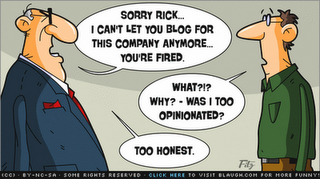
Wednesday, December 2, 2009
Use of Blogs in Organizational Context

The number of organizations that has started to create blogs in increasing ,bellow is a link to show examples of organizations that are putting blogs to good use:
http://www.netsquared.org/blog/amysampleward/organizations-putting-blogs-good-use
Advantages:
1. Quick And Easy
It is quick and easy to build and might be done by one technician, while in comparison setting up a website takes more time and might need more than one technician .
2. Inexpensive setup
It is allot cheaper then setting up a website since there are already free blogging services such as Blogger available, and usually it only need one technician to do it
3. Builds Stronger and more loyal relationships
Blogs have potential to help the organization develop stronger relationships and brand loyalty with its customers, as they interact with the 'human face' of the organization through blogs. [1]
4. Reduces cost of hiring additional employees.
By posting information about the products on your blog you might decrease the number employees hired to answer the endless questions received by phone calls and E-mails.
5. Feedback and Gaining an Insight into your Customers
The comments that customers leave can be used for more than just collecting feedback , in addition is can be used as a mean to understand you customers and how they react to each post.
6. Accessible
It does’t matter whether you are not, but you and your company will appear to be more accessible especially if you allow freedom for all your visitors to post comments. Accessibility is often a stumbling block for many potential customers that still prefer to deal with companies offline. A blog makes you more approachable and so alleviates this concern.[2]
Disadvantages
1. Maintenance
Like practically everything else on the Web, blogs are easy to start and hard to maintain. Writing coherently is one of the most difficult and time-consuming tasks for a human being to undertake. So, far from blogs being a cheap strategy, they are a very expensive one, in that they eat up time. As a result, many blogs are not updated, thus damaging rather than enhancing the reputation of the organization. [1]
2. Can be a source of trouble
Blogs can create trouble for company and create confusion for the customers if they they are not coherent and misleading.
3. Imitation of competitive advantage
Blogs are a great way to share information and ideas with customers and suppliers, but since blogs are free for everyone to see chances are that competitors might take this competitive advantage and imitate it.
4. Poorly Written Blogs
The best non-corporate blogs are spontaneous and genuine. Poorly written corporate blogs can look fake or perhaps worse, they reveal incompetence on he part of the writer. [3]
http://www.netsquared.org/blog/amysampleward/organizations-putting-blogs-good-use
Advantages:
1. Quick And Easy
It is quick and easy to build and might be done by one technician, while in comparison setting up a website takes more time and might need more than one technician .
2. Inexpensive setup
It is allot cheaper then setting up a website since there are already free blogging services such as Blogger available, and usually it only need one technician to do it
3. Builds Stronger and more loyal relationships
Blogs have potential to help the organization develop stronger relationships and brand loyalty with its customers, as they interact with the 'human face' of the organization through blogs. [1]
4. Reduces cost of hiring additional employees.
By posting information about the products on your blog you might decrease the number employees hired to answer the endless questions received by phone calls and E-mails.
5. Feedback and Gaining an Insight into your Customers
The comments that customers leave can be used for more than just collecting feedback , in addition is can be used as a mean to understand you customers and how they react to each post.
6. Accessible
It does’t matter whether you are not, but you and your company will appear to be more accessible especially if you allow freedom for all your visitors to post comments. Accessibility is often a stumbling block for many potential customers that still prefer to deal with companies offline. A blog makes you more approachable and so alleviates this concern.[2]
Disadvantages
1. Maintenance
Like practically everything else on the Web, blogs are easy to start and hard to maintain. Writing coherently is one of the most difficult and time-consuming tasks for a human being to undertake. So, far from blogs being a cheap strategy, they are a very expensive one, in that they eat up time. As a result, many blogs are not updated, thus damaging rather than enhancing the reputation of the organization. [1]
2. Can be a source of trouble
Blogs can create trouble for company and create confusion for the customers if they they are not coherent and misleading.
3. Imitation of competitive advantage
Blogs are a great way to share information and ideas with customers and suppliers, but since blogs are free for everyone to see chances are that competitors might take this competitive advantage and imitate it.
4. Poorly Written Blogs
The best non-corporate blogs are spontaneous and genuine. Poorly written corporate blogs can look fake or perhaps worse, they reveal incompetence on he part of the writer. [3]
FOR MORE ABOUT THE ADVANTAGES AND DISADVANTAGES:
URL Sources:
[1] http://archive.websitenotes.com/websitenotes-37-20040823BlogsandBloggingAdvantagesandDisadvantages.html
[2] http://www.webreference.com/authoring/bus_blog/
[3] http://www.enterpriseblogs.info/corporate-blogging/disadvantages
[1] http://archive.websitenotes.com/websitenotes-37-20040823BlogsandBloggingAdvantagesandDisadvantages.html
[2] http://www.webreference.com/authoring/bus_blog/
[3] http://www.enterpriseblogs.info/corporate-blogging/disadvantages
Monday, November 30, 2009
An Introduction to Microsoft Excel

Microsoft Excel
What is Microsoft excel?
one of the most widely used application software's in businesses today, is a spreadsheet software which uses graphs,charts, pies, rows and columns to organize data. It can also manipulated formulas and allow the software to perform mathematical functions on the data .
Who produces and sells it?
Excel written and distributed by Microsoft for Microsoft Windows and Mac OS X.[1
How many versions are there?
Since 1985, there have been ten different versions distributed for Windows, and twelve versions for Mac OS X.
Which type of organizations uses it?
It used by both big organizations as well as small ones.
How long has it been in the market?
Although Microsoft Excel has been in the market since 1987, it did not take off until 1993. In 2003 and 2007 Microsoft made Training and Demo application available.
Is it accurate?
Due to Excel's foundation on floating point calculations, the statistical accuracy of Excel has been criticized as lacking certain statistical tools.[2]
Due to Excel's foundation on floating point calculations, the statistical accuracy of Excel has been criticized as lacking certain statistical tools.[2]
FOR MORE ABOUT MICROSOFT EXCEL:
URL source:
[2] http://www.sciencedirect.com/science?_ob=ArticleURL&_udi=B6V8V-4S1S6FC-5&_user=10&_rdoc=1&_fmt=&_orig=search&_sort=d&_docanchor=&view=c&_acct=
C000050221&_version=1&_urlVersion=0&_userid=10&md5=131049fba0262749e45f7a9
6e3c79748
Monday, November 23, 2009
Advantages and Disadvantages of Microsoft Excel

Advantages:
1. Sent through Emails
Excel can be sent through email and viewed by most
smartphones which makes more convenient .
2. Part of Microsoft Office
Excel is a part of the Microsoft office which comes with most
PC so there is no need to purchase or install it.
3. An All in One Program
Excel is an all in one programme and does not need the addition
of financial subsets.
4. Availability of Training Programs and Training Courses
There is training programs and even training courses to make
users more familiar with Excel.
5. Secure
Excel files can be password protected for extra security. A
user can create a password through Visual Basic programming or
directly within the Excel file.[1]
6. Easy connection to OLAP
Excel is capable of connecting directly to OLAP databases and
can be integrated in Pivot Tables.[2]
can be integrated in Pivot Tables.[2]
Disadvantages:
1. Viruses
Viruses can be attached to an Excel file through macros. Macros
are mini programs that are written into an Excel spread sheet.
[1]
2. Slow Execution
Using only one file can make the file size very big and as a
result the program might run slowly.
3. Loss of Data
So you might have to break it into smaller files, by doing so
there is an increased risk in Excel data being lost.
4. Hard to Use
Although there are training programs, it is still hard to use
and some users might not get the hang of it.
5. Space Limit
5. Space Limit
It limits the number of rows and columns you can use.
FOR MORE INFORMATION ABOUT THE ADVANTAGES AND DISADVANTAGES:
http://money.cnn.com/2006/02/28/news/companies/pluggedin_fortune/index.htm
URL Sources:[1]http://www.ehow.com/facts_4814365_advantages-disadvantages-microsoft-excel.html
[2] http://msexcelvba.blogspot.com/2008/05/advantages-and-disadvantages-of.html
Subscribe to:
Comments (Atom)